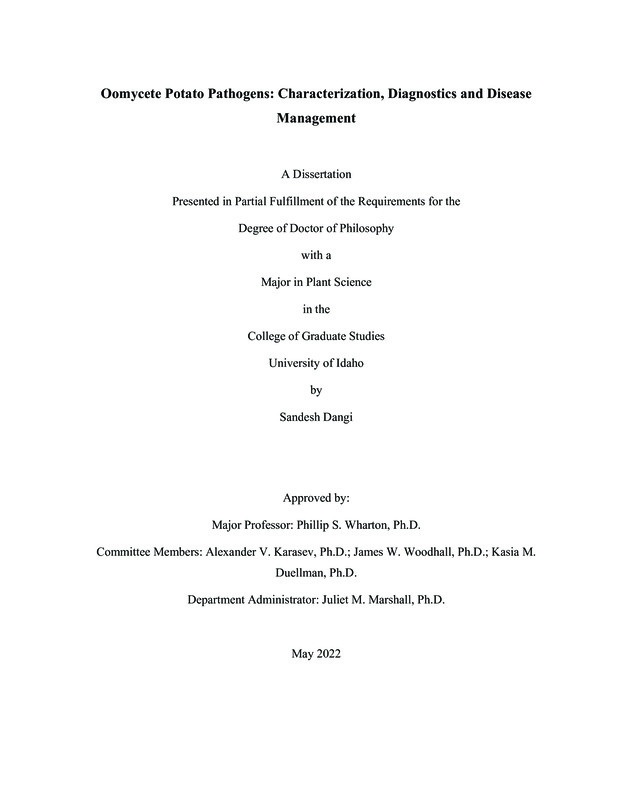OOMYCETE POTATO PATHOGENS: CHARACTERIZATION, DIAGNOSTICS, AND DISEASE MANAGEMENT
Dangi, Sandesh. (2022-05). OOMYCETE POTATO PATHOGENS: CHARACTERIZATION, DIAGNOSTICS, AND DISEASE MANAGEMENT. Theses and Dissertations Collection, University of Idaho Library Digital Collections. https://www.lib.uidaho.edu/digital/etd/items/dangi_idaho_0089e_12327.html
- Title:
- OOMYCETE POTATO PATHOGENS: CHARACTERIZATION, DIAGNOSTICS, AND DISEASE MANAGEMENT
- Author:
- Dangi, Sandesh
- Date:
- 2022-05
- Keywords:
- LAMP P. infestans Late Blight Multiplex SSR Pink rot Potato Pythium Leak
- Program:
- Plant Sciences
- Subject Category:
- Plant sciences; Plant pathology
- Abstract:
-
Oomycete pathogens such as Phytophthora infestans, P. erythroseptica, and Pythium ultimum infect potato in the field and storage, causing significant yield and storage losses. These oomycete pathogens are major constraints to profitable potato production. Late blight caused by Phytophthora infestans is a severe problem in most major potato production countries. Breeding for late blight resistance would be the best way to control late blight in developing countries due to the reduced exposure to fungicides, less residues in food, land, and water, and reduced cost of fungicides. The Feed the Future Biotechnology Potato Partnership (FtFBPP) was formed in 2015 as a 5-year, multi-institutional cooperative agreement with USAID to introduce bioengineered 3 R-gene potato cultivars into Bangladesh and Indonesia. Before releasing the bio-engineered potato cultivars, we need to know the P. infestans populations in Bangladesh and Indonesia. So, to determine the genotypes present in these countries, 160 samples from Bangladesh and 146 samples from Indonesia were collected and characterized based on one-step multiplex microsatellite markers, mating type, mitochondrial haplotype, and metalaxyl-M sensitivity test. Microsatellite analysis revealed that EU_13_A2 (metalaxyl-M resistant genotype) caused late blight outbreaks in Bangladesh and EU_2_A1 (metalaxyl-M sensitive genotype) in Indonesia. We also found a large sub-clonal variation of EU_13_A2 in Bangladesh and other unique genotypes in Indonesia. These findings will serve as a baseline to inform the development of integrated strategies to extend the efficacy and durability of the USAID FtFBPP 3 R-gene potato cultivars developed for release in Bangladesh and Indonesia.Late blight can destroy potato fields in a few days under conducive environmental conditions if proper control measures are not applied. Early detection of P. infestans and the identification of genotypes can ensure the timely implementation of an optimum disease management strategy. Recently, loop-mediated isothermal amplification (LAMP) assays have become more widely used for the rapid on-site detection of P. infestans. We developed a new LAMP assay using the ypt1 gene. Our LAMP assay was tested for sensitivity, specificity, and detection limit and compared with other previously developed assays. Our LAMP assay was superior in sensitivity and specificity over other LAMP assays, since it did not cross-react with species closely related to P. infestans, except for P. andina and P. ipomoeae. Phytophthora ipomoeae was easy to distinguish because it amplified very late in the reaction. The lower limit of detection (LOD) of our LAMP assay was determined to be 1 pg/µL (LAMP run for 25 min) for pure culture. Our LAMP assay can be used in the field to detect P. infestans so that growers can use proper control measures to reduce the loss caused by this pathogen. Potatoes are kept in storage for a few weeks to several months after harvest based on the intention of use or market availability. Potato tubers contaminated or infected in the field during the growing season or at harvest are vulnerable to many storage rot diseases such as Pythium leak and pink rot. Due to limited chemical control measures, the quality and health of tuber are compromised in storage, causing significant economic loss. Much research has been focused on different cultural and epidemiological factors of the storage diseases of potatoes. The disease severity in tubers infected with Pythium ultimum was reported to be higher at high storage temperatures. A systematic study was conducted to determine the level of disease severity at four pre-storage temperatures (15°C, 20°C, 25°C, and 30°C), and two storage temperatures, 8.8°C, and 12.8°C, to emulate the conditions in commercial storage and temperatures at harvest and prior to storage. In our findings, the tubers incubated at 15°C and stored at 8.8°C had the lowest disease severity and incidence followed by those incubated at 20°C prior to storage. Similarly, disease severity and incidence were lower in tubers incubated at 15°C and stored at 12.8°C. In artificial inoculation experiments, tubers showed symptoms much earlier than the naturally infected tubers. However, the trend of disease development over time was similar. Another study found that Pythium inoculum as low as one spore was enough to initiate disease. In summary, a temperature higher than 20°C during harvest and storage temperatures of 12.8°C, high inoculum density in the field, wounding, and bruising lead to high disease severity in the storage. Seven commercially available in-season foliar fungicides were evaluated for control of Pythium leak and pink rot in storage. Potato tubers harvested and stored at 12.8°C for two to three months were challenge-inoculated and stored at 18°C for 30 days. The volume covered by the Pythium leak or pink rot symptoms was recorded for disease severity in percentage. None of the fungicides tested significantly reduced the Pythium leak in storage in all three years except in 2018 (field 113). Both rates of phosphorous acid significantly reduced the Pythium leak in storage. In pink rot trials, both rates of phosphorous acid, cyazofamid, fluazinam, oxathiapiprolin, and mefenoxam significantly reduced the pink rot in storage. Therefore, the findings of this study can be added to an integrated disease management strategy to reduce the loss in storage.
- Description:
- doctoral, Ph.D., Plant Sciences -- University of Idaho - College of Graduate Studies, 2022-05
- Major Professor:
- Wharton, Phillip S.
- Committee:
- Karasev, Alexander V.; Woodhall, James W.; Duellman, Kasia M.; Marshall, Juliet M.
- Defense Date:
- 2022-05
- Identifier:
- Dangi_idaho_0089E_12327
- Type:
- Text
- Format Original:
- Format:
- application/pdf
- Rights:
- In Copyright - Educational Use Permitted. For more information, please contact University of Idaho Library Special Collections and Archives Department at libspec@uidaho.edu.
- Standardized Rights:
- http://rightsstatements.org/vocab/InC-EDU/1.0/

